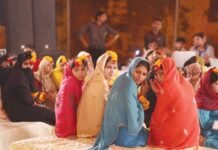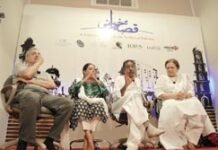Leading painter, conservationist and a key member of the Lahore Bachhao Tehreek, Dr Ajaz Anwar had everybody misty eyed. At a rather ‘semi-formal’ storytelling session, the kind Lahore has better known as ‘baithak,’ conducted at the Faiz Ghar recently, Dr Anwar was telling a tale to a smallish but highly attentive crowd of audience.
It was a short story, in Punjabi language, about a about a man who, having slept for 40-odd years, wakes up into the present-day world and is in complete disarray, because everything around him seems to have changed dramatically.

There was complete silence as he read out the story; the audience, perched on the carpeted floor, seemed to relate with the character in so many ways.
At the three-day event, fondly named ‘Qissa Khwani’ after the very famous bazaar in Peshawar which is known for having travellers stop by and regale each other with ‘qissas’ (or tales) a la Chaucer’s Canterbury Tales, organised by the Citizens Archive of Pakistan (CAP), Dr Ajaz Anwar was the last to follow. He was preceded by a host of distinguished Lahoris, a mix of literati, academics and performing artists like Ayub Khawar, Naveed Shahzad, Salman Shahid, Begum Khurshid Shahid, Seemi Raheal, Nusrat Jamil and Ahmad Rafay Alam.
The animated storytelling session was followed by an interaction with the audience which prompted the elderly among them to share their own experiences of Lahore with the younger lot present inside the Faiz Ghar.
Earlier, Qissa Khwani kicked off with Owais Rana of CAP talking briefly about how the idea of reviving the tradition of storytelling had crossed his mind. Day 1’s theme was ‘Partition and Migration’ and saw panelists like Brig (r) Salim Zia, Jamila Zaidi, Zahida Mushtaq and Azra Haq.
The theme of Day 2 was ‘PTV and Radio Pakistan,’ so the discussion obviously hinged around it, moderated by a very charged and well-spoken Adeel Hashmi.
Personal anecdotes by individuals in the crowd, some funny and some serious, contributed to the stories narrated by veteran panelists that warmed the cockles of everybody’s hearts.

It was also revealed that CAP has archived and digitised newspapers, letters, official correspondences, refugee cards, passports, advertisements, and other material that depict stories of Pakistan.
Day 3, titled ‘Evolution of Cities,’ had renowned architect Nayyar Ali Dada besides Dr Ajaz Anwar, Nuscie Jamil, Salman Rashid and Imrana Tiwana speak on the history of Lahore with great passion and authority.
Nayyar Ali Dada talked about preservation and the need for controlling environmental pollution. “The space of the city is being eroded by bad planning and the sad fact is that the control of decision-making by the government is only 40 per cent; the rest is manipulated by the mafia.”
He also spoke of the urban sprawl, the right of the citizens to have green areas, footpaths and parks.
Salman Rashid came across as a vociferous speaker who said that the early 1980s were the times when “[during] Zia’s martial law, many people became rich because of the influx of petro-dollars.” He gave the example of Shikarpur which was “dismantled by senseless people in the name of development.
“Old houses and trees were gone and we began to lose our identity by divorcing ourselves from reality; nothing remained sacred for us,” he concluded.
Dr Imrana Tiwana, an architect and a conservationist, made an appeal for rekindling the memoirs of the glorious past of the city. “Lahore is rapidly losing its vibrancy,” she announced. “The saying that ‘Lahore Lahore hai’ can only hold true if the citizens stick to their roots and values.”
The last decade or so has seen a massive rural to urban shift and the trend seems to multiply the problems of the Lahore, she said, while adding vehemently that steps should be taken to promote the city’s culture, protect historical buildings and the walled city heritage. For Dr Tiwana, it’s imperative to understand what conservation is and how can the maximum population of the city take advantage of developmental projects like the Rapid Bus Transit and the widening of the roads.
She pointed out the example of Hudyara Drain which was once a stream and home to fishes and turtles but has now become a toxic sewer because of the vested interests of the high and the mighty.
Nusrat aka Nuscie Jamil took the audience on a journey down memory lane when Lahore had no security issues and there were multi-ethnic societies living in unison. She rightfully pointed out that “religion was practised but none of it was imposed on anyone. It’s the absence of Christians, Hindus and Parsis from our daily lives which is another point to ponder about.
“Where have these people disappeared?” she asked. “The society, in olden days, used to be far more open, lively and interactive.”
Nuscie spoke of having “witnessed cabarets, hotels serving alcohol and Ahmadis, Shias and Sunnis going to the same mosques for prayers.”





































